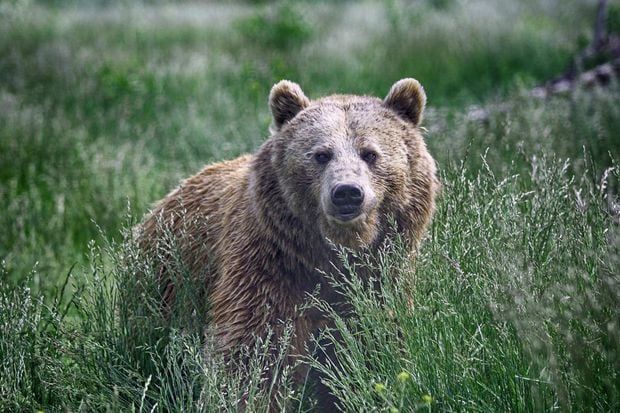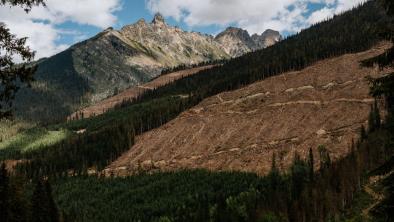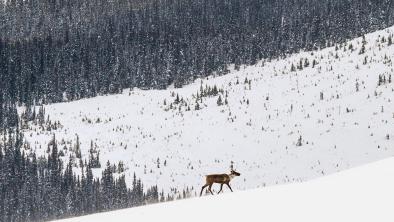NDP to enact B.C.-wide ban on grizzly trophy hunt, while allowing hunt for meat
Monday, August 14, 2017
Vancouver Sun
The NDP government made good on a high-profile election promise Monday by announcing a B.C.-wide ban on the trophy hunting of grizzly bears, while allowing hunting to continue for meat.

NREFLECT/GETTY IMAGES/ISTOCKPHOTO
Minister of Forests, Lands, Natural Resource Operations and Rural Development Doug Donaldson told a news conference that grizzly trophy hunting is “not a socially acceptable practice in 2017” and encouraged wilderness operators to look instead to the economics of bear viewing.
Effective Nov. 30, 2017, the province pledges to “end grizzly bear trophy hunting throughout the province and stop all hunting of grizzlies in the Great Bear Rainforest,” Donaldson said. The timing of the ban allows hunts already scheduled for this fall to continue.
While the grizzly trophy hunt will end, hunting for meat may continue outside the Great Bear Rainforest.
The province will close “loopholes” by forbidding a meat hunter from possessing the paws, head, and hide of a grizzly to ensure trophy hunts are not conducted under the guise of a meat hunt, he added.
About 170 grizzlies are killed annually in B.C. by resident hunters and 80 by foreign hunters accompanied by commercial guides. The total number of grizzlies killed is expected to drop significantly under the new law.
There are an estimated 15,000 grizzly bears in B.C. The province says the hunt is conservatively managed at two to four per cent of the population.
The province receives about $540,000 in grizzly hunting licences and limited-entry hunt applications annually. Of that, $500,000 goes into general revenue, and $40,000 to the Habitat Conservation Trust Foundation.
The province is committed to providing economic assistance to commercial hunting outfitters, who earn tens of thousands of dollars per grizzly hunt, but details remain to be determined.
Scott Ellis, executive-director of the Guide Outfitters Association of B.C., said: “It is a sad day when we move away from science-based decisions. This will cost jobs and bankrupt businesses” in rural B.C.
Environmental groups generally responded enthusiastically to the province’s decision, while preferring that food hunts outside the Great Bear Rainforest had also been banned.
“We’re glad the senseless killing of grizzly bears is coming to an end,” said Joe Foy, national campaign director with the Wilderness Committee. “Now this at-risk species has a better chance to recover.”
Raincoast Conservation Foundation called the announcement in the Great Bear Rainforest “a solid step forward” for wildlife management in B.C. The group reserved decision on a meat hunt elsewhere, arguing “virtually no one legitimately hunts grizzlies for food; killing these bears is strictly a trophy hunt.”
Ian McAllister, co-founder of Pacific Wild, said: “It is good news for the Great Bear Rainforest, but the issue of packing out the meat is such a shame.”
Faisal Moola, a director-general with the David Suzuki Foundation, said he welcomed the province’s decision, but “remains concerned that the government will still allow the killing of these majestic animals for their meat.”
The Liberals pledged during the election to end the grizzly trophy hunt in the Great Bear Rainforest, where Coastal First Nations vigorously oppose the blood sport, but not the rest of the province.
The Green party’s position was to require any grizzly hunter to pack the meat home — a law that would effectively stop foreign trophy hunters of grizzlies, but not residents.
In response to Monday’s announcement, Green party leader Andrew Weaver said foreign hunters will still be able to shoot grizzlies in B.C., “take a picture of themselves standing over the dead beast, and head back home without harvesting any of the animal.”
He added: “I’m not sure how this will appease the concerns of anyone. It appears to me that the NDP were trying to play to environmental voters in the election campaign without thinking through their policies.
“What we really need in B.C. is science-based approach to wildlife management, not a populist approach to species management.”
During the fall months, Donaldson said that government will consult with First Nations and stakeholders to determine next steps and details of the trophy hunt ban. Additionally, the government will be moving forward with a broader consultation process on a renewed wildlife management strategy for the province.
In a highly publicized case in 2013, National Hockey League defenceman Clayton Stoner ignored the wishes of local aboriginals and shot an adult male grizzly in the Kwatna River estuary. In 2016, Stoner was fined $10,000 under the Wildlife Act for hunting without a proper licence and banned from hunting for three years.
Read the original article here


